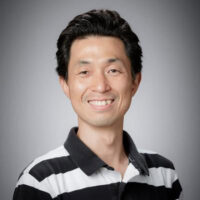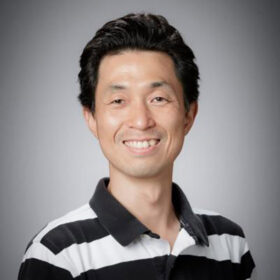
Expertise
Biological wastewater treatment, water reuse, physical/chemical water treatment, nutrient recovery, energy recovery, water quality sensors, heavy metal removal, anaerobic digestion, sludge pre/post-treatment, numerical modeling, microbial electrochemistry, ion exchange membrane, salinity gradient energy, point-of-use drinking water treatment.
Areas of Specialization
Research Clusters
Current status
-
Accepting graduate students
-
Professor
Civil Engineering
Overview
My research group is currently investigating new wastewater treatment technologies for: (1) Nutrient removal/recovery; (2) Heavy metal removal; (3) Water reuse; and (4) Anaerobic digestion. We study bioelectrochemical systems and ion exchange membrane applications for energy-efficient recovery of nutrients from wastewater (e.g., source separated human urine, dewatering centrate). We also research bioelectrochemical systems for efficient separation of toxic heavy metals (e.g., cadmium, lead, chromium) from wastewater. Anaerobic digestion of wastewater sludge is another key area in my research program. To improve biogas production and sludge stabilization, we look into kinetics of various biological reactions in thermophilic pretreatment of wastewater sludge. We are also developing new numerical models and sludge characterization methods for reliable prediction in wastewater sludge treatment.
My group also researches fundamentals of bioelectrochemical systems or microbial electrochemistry cells, such as (1) Electron transfer models; (2) Kinetic constant estimation; and (3) Bioanode sensors. We are currently developing reliable enzyme kinetic models to understand electric current generation by exoelectrogenic bacteria. We also work on estimating kinetic constants for the growth and decay of exoelectrogenic bacteria in microbial electrochemistry cells. Bioanode sensors are an emerging technology as a water quality monitoring tool because bioanodes can create measurable electric signals by exoelectrogenic bacteria and the bacteria are sensitive to various water quality parameters, such as readily biodegradable organics, heavy metals, and nutrients. We are focusing on eliminating and controlling the hysteresis effect which is known to be one of the main challenges for accurate bioanode sensor applications.
My research team has been working on various topics on sustainable wastewater treatment and resources recovery from organic wastes/CO2. Current research projects in my lab include: biopolymer production from waste organics and CO2 using Cuprividus necator; biofuel production using Euglena gracilis; electrodialysis applications for selective separation of lithium ion; artificial intelligence applications on water quality monitoring in engineered and natural water systems (e.g., sludge bulking monitoring and cyanobacteria detection); nutrient removal in wastewater treatment by integrating Anammox in membrane aerated biofilm reactors; and numerical model development for various wastewater treatment processes.
B.E., M.S. (Korea University)
Ph.D. (Texas at Austin)
Canada Research Chair Tier II in Water and Health
- Al-Ani, S., Kim, Y. “Carbon preference by Cupriavidus necator for growth and accumulation phases: Heterotrophic vs. autotrophic metabolisms” Journal of Power Sources 626 (2025) 235797.
- Hong, T., Peng, M., Kim, Y., Schellhorn, H., Fang Q. “Automated cell profiling in imaging flow cytometry with annotation-efficient learning” Optics & Laser Technology 181 (2025) 111992.
- Panagoda, S., Yuan, P., Pavlovic, V., Barber, J., Kim, Y. “Enhancing ammonia recovery through pH polarization in bipolar membrane electrodialysis” Environmental Science: Advances 3 (2024) 1309-1316.
- Al-Ani, S., Guo, H., Fyfe, S., Long Z., Donnaz, S., Kim, Y. “Deep learning-based image analysis for filamentous and floc-forming bacteria in wastewater treatment” Journal of Water Process Engineering 65 (2024) 105772.
- Shiu, N., Guo, H., Kim, Y. “Heated Aeration for Nitrite-Oxidizing Bacteria (NOB) Control in Anammox-Integrated Membrane-Aerated Biofilm Reactors (MABR)” Environments 11 (2024) 155.
- Amer, A., Kim Y. “Rapid enrichment of Cupriavidus necator in mixed microbial cultures using autotrophic growth: mixed microbial cultures for biodegradable polymer production using CO2 and organic wastes” Environmental Engineering Science 40 (2023) 472–481.
- Amer, A., Kim, Y. “Minimizing the lag phase of Cupriavidus necator growth under autotrophic, heterotrophic, and mixotrophic conditions” Applied Environ Microbiology 89 (2023) e02007-22.
- Amer, A., Kim, Y. “Modeling the growth of diverse microorganisms during feast-famine enrichment” Water Environment Research 94 (2022) e10803.
- Alsheet, F., Razaqpur, A. G., Kim, Y. “Influence of chloride transport modes and hydrated cement chemistry on chloride profile and binding mechanisms in concrete” J Materials in Civil Engineering 34 (2022) 04022351.
- Elsayed, A., Yu, J., Lee, T., Kim, Y. “Model study on real-time aeration based on nitrite for effective operation of single-stage Anammox” Environmental Research 212 (2022) 113554.
- Zakaria, B. S., Guo, H., Kim, Y., Dhar, B. R. “Molecular biology and modeling analysis reveal functional roles of propionate to acetate ratios on microbial syntrophy and competition in electro-assisted anaerobic digestion” Water Research 216 (2022) 118335.
- Chidiac, C., Kim, Y., de Lannoy, C. “Enhanced Pb(II) removal from water using conductive carbonaceous nanomaterials as bacterial scaffolds: an experimental and modelling approach” Journal of Hazardous Materials 431 (2022) 128516.
- Elsayed, A., Kim, Y. “Estimation of kinetic constants in high-density polyethylene bead degradation using hydrolytic enzymes” Environmental Pollution 298 (2022) 118821.
- Amer, A., Kim, Y. “Isolation of Pb(II)-reducing bacteria and demonstration of biological Pb(II) reduction to metallic Pb” Journal of Hazardous Materials 423 (2022) 126975.
- Piccolo, N., Goel, R., Snowling, S., Kim, Y. “Modelling the anaerobic digestion of wastewater sludge under sulfate-rich conditions” Water Environmental Research 93 (2021) 2084-2096.
- Guo, H., Kim, Y. “Membrane scaling in electrodialysis fed with high-strength wastewater” Environmental Engineering Science 38 (2021) 832-840.
- Mohammadi, M., Guo, H., Yuan, P., Pavlovic, V., Barber, J., Kim, Y. “Ammonia separation from wastewater using bipolar membrane electrodialysis” Electrochemical Science Advances 1 (2021) e200030.
- Elsayed, A., Hurdle, M., Kim, Y. “Comprehensive model applications for better understanding of pilot-scale membrane-aerated biofilm reactor performance” Journal of Water Process Engineering 40 (2021) 101894.
- Yu, J., Park, Y., Wdyaningsih, E., Kim, S., Kim, Y., Lee, T. “Microbial fuel cells: device for real wastewater treatment, rather than electricity production” Science of the Total Environment 775 (2021) 145904.
- Guo, H., Yuan, P., Pavlovic, V., Barber, J., Kim, Y. “Ammonium sulfate production from wastewater and low-grade sulfuric acid using bipolar-and cation-exchange membranes” Journal of Cleaner Production 285 (2021) 124888.
- Hirmiz, Y., Kim, Y. “Fractionated volatile solids for understanding thermophilic pretreatment of waste activated sludge at 55, 65, and 75°C” Water Environment Research 93 (2021) 201-206.
- Qadir, M., Drechsel, P., Cisneros, B. J., Kim, Y., Pramanik, A., Mehta, P., Olaniyan, O. “Global and regional potential of wastewater as a water, nutrient and energy source” Natural Resources Forum 44 (2020) 40-51.
- Al-Ani, S., Kim, Y. “Carbon preference by Cupriavidus necator for growth and accumulation phases: Heterotrophic vs. autotrophic metabolisms” Journal of Power Sources 626 (2025) 235797.
- Hong, T., Peng, M., Kim, Y., Schellhorn, H., Fang Q. “Automated cell profiling in imaging flow cytometry with annotation-efficient learning” Optics & Laser Technology 181 (2025) 111992.
- Panagoda, S., Yuan, P., Pavlovic, V., Barber, J., Kim, Y. “Enhancing ammonia recovery through pH polarization in bipolar membrane electrodialysis” Environmental Science: Advances 3 (2024) 1309-1316.
- Al-Ani, S., Guo, H., Fyfe, S., Long Z., Donnaz, S., Kim, Y. “Deep learning-based image analysis for filamentous and floc-forming bacteria in wastewater treatment” Journal of Water Process Engineering 65 (2024) 105772.
- Shiu, N., Guo, H., Kim, Y. “Heated Aeration for Nitrite-Oxidizing Bacteria (NOB) Control in Anammox-Integrated Membrane-Aerated Biofilm Reactors (MABR)” Environments 11 (2024) 155.
- Amer, A., Kim Y. “Rapid enrichment of Cupriavidus necator in mixed microbial cultures using autotrophic growth: mixed microbial cultures for biodegradable polymer production using CO2 and organic wastes” Environmental Engineering Science 40 (2023) 472–481.
- Amer, A., Kim, Y. “Minimizing the lag phase of Cupriavidus necator growth under autotrophic, heterotrophic, and mixotrophic conditions” Applied Environ Microbiology 89 (2023) e02007-22.
- Amer, A., Kim, Y. “Modeling the growth of diverse microorganisms during feast-famine enrichment” Water Environment Research 94 (2022) e10803.
- Alsheet, F., Razaqpur, A. G., Kim, Y. “Influence of chloride transport modes and hydrated cement chemistry on chloride profile and binding mechanisms in concrete” J Materials in Civil Engineering 34 (2022) 04022351.
- Elsayed, A., Yu, J., Lee, T., Kim, Y. “Model study on real-time aeration based on nitrite for effective operation of single-stage Anammox” Environmental Research 212 (2022) 113554.
- Zakaria, B. S., Guo, H., Kim, Y., Dhar, B. R. “Molecular biology and modeling analysis reveal functional roles of propionate to acetate ratios on microbial syntrophy and competition in electro-assisted anaerobic digestion” Water Research 216 (2022) 118335.
- Chidiac, C., Kim, Y., de Lannoy, C. “Enhanced Pb(II) removal from water using conductive carbonaceous nanomaterials as bacterial scaffolds: an experimental and modelling approach” Journal of Hazardous Materials 431 (2022) 128516.
- Elsayed, A., Kim, Y. “Estimation of kinetic constants in high-density polyethylene bead degradation using hydrolytic enzymes” Environmental Pollution 298 (2022) 118821.
- Amer, A., Kim, Y. “Isolation of Pb(II)-reducing bacteria and demonstration of biological Pb(II) reduction to metallic Pb” Journal of Hazardous Materials 423 (2022) 126975.
- Piccolo, N., Goel, R., Snowling, S., Kim, Y. “Modelling the anaerobic digestion of wastewater sludge under sulfate-rich conditions” Water Environmental Research 93 (2021) 2084-2096.
- Guo, H., Kim, Y. “Membrane scaling in electrodialysis fed with high-strength wastewater” Environmental Engineering Science 38 (2021) 832-840.
- Mohammadi, M., Guo, H., Yuan, P., Pavlovic, V., Barber, J., Kim, Y. “Ammonia separation from wastewater using bipolar membrane electrodialysis” Electrochemical Science Advances 1 (2021) e200030.
- Elsayed, A., Hurdle, M., Kim, Y. “Comprehensive model applications for better understanding of pilot-scale membrane-aerated biofilm reactor performance” Journal of Water Process Engineering 40 (2021) 101894.
- Yu, J., Park, Y., Wdyaningsih, E., Kim, S., Kim, Y., Lee, T. “Microbial fuel cells: device for real wastewater treatment, rather than electricity production” Science of the Total Environment 775 (2021) 145904.
- Guo, H., Yuan, P., Pavlovic, V., Barber, J., Kim, Y. “Ammonium sulfate production from wastewater and low-grade sulfuric acid using bipolar-and cation-exchange membranes” Journal of Cleaner Production 285 (2021) 124888.
- Hirmiz, Y., Kim, Y. “Fractionated volatile solids for understanding thermophilic pretreatment of waste activated sludge at 55, 65, and 75°C” Water Environment Research 93 (2021) 201-206.
- Qadir, M., Drechsel, P., Cisneros, B. J., Kim, Y., Pramanik, A., Mehta, P., Olaniyan, O. “Global and regional potential of wastewater as a water, nutrient and energy source” Natural Resources Forum 44 (2020) 40-51.









